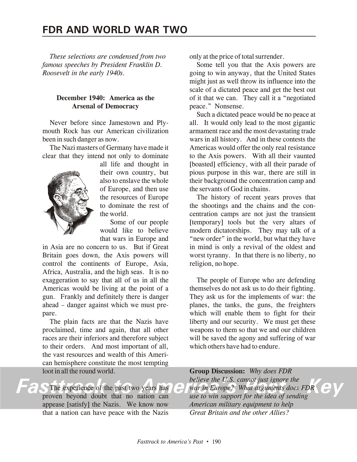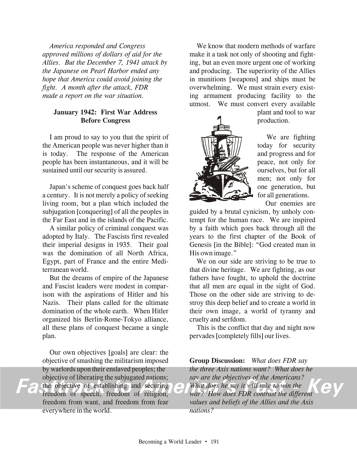| Fasttrack
to America's Past Teacher Key |
|
| Fasttrack
to America's Past Teacher Key |
|
 Page 190  Page 191 |
Page 190
& 191 -
FDR and World War Two The reading selections Both selections on these pages are from famous speeches made by President Franklin Delano Roosevelt as the Axis Powers spread war around the world. In the first speech, late in 1940, FDR calls on Americans to help the Allies by supplying weapons to help them defend themselves. America, he declared, could avoid having to send soldiers into war by serving the Allied cause as an "Arsenal of Democracy." (An arsenal is a place where weapons and military equipment are produced or stored.) The second speech was made the month after the attack by the Japanese on Pearl Harbor, which ended any hope that America could sit on the sidelines. The speech is important because it spells out the objectives of America in the war. The freedoms that FDR speaks about became known as "The Four Freedoms." Roosevelt also used the speech to explain in powerful words the moral purpose that united the Allies against the Axis powers. The pictures 1. Franklin Delano Roosevelt, president during most of World War Two. He died in 1945, just months before the surrender of Germany and Japan. 2. A World War Two era battleship. Battleships played important roles in the war in both the Atlantic and Pacific oceans. Group discussion questions, page 190 FDR points out that if victorious, the Nazis would be able to spread their cruel system of murder and oppression. There would be no more liberty, no religion, and no hope. He argues that America can avoid sending its own citizens into the war by sending weapons and supplies to help Great Britain and the other Allies defeat the Nazis. Group discussion questions, page 191 FDR gives this summary of what the three Axis nations want: Japan - wants
to subjugate
all the peoples of the Far East and the islands of the Pacific.
FDR makes it clear that to achieve victory, the U.S. would need to vastly increase its output of weapons and supplies of all kinds. The superiority of the Allies must be "overwhelming." The president declares
that a fundamental
moral principle is at stake in the war. FDR says that Americans
are
fighting to uphold a deep belief, "the doctrine that all men are equal
in the sight of God." He traces that principle to a line in the
Book
of Genesis in the Bible. The same principle, of course, is also
expressed in America's Declaration of Independence.
|
|
Copyright Notice
Copyright 2018 by David Burns. All rights reserved. Illustrations and reading selections appearing in this work are taken from sources in the public domain and from private collections used by permission. Sources include: the Dover Pictorial Archive, the Library of Congress, The National Archives, The Hart Publishing Co., Corel Corporation and its licensors, Nova Development Corporation and its licensors, and others. Maps were created or adapted by the author using reference maps from the United States Geological Survey and Cartesia Software. Please see the home page for this title for more information. |